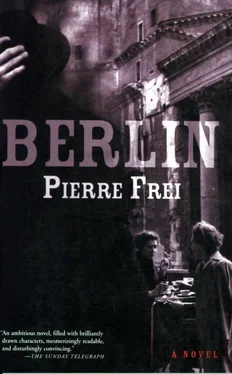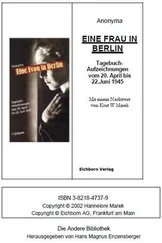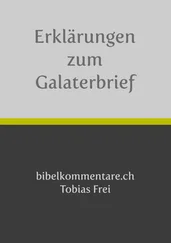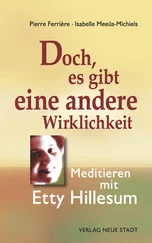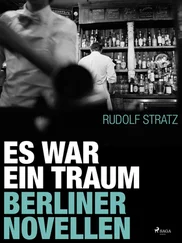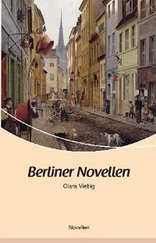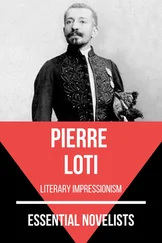Jochen… A melancholy feeling came over her, but soon changed to busi ness-like determination. She'd go and fetch him home. This was her evening off. A good opportunity.
As seven approached she took off her white overall, and slipped on the threadbare jacket that had once been part of an elegant tailored suit. She wore it now with a light, pale-blue summer dress that set off her slender brown legs prettily. She cycled the few minutes to Onkel Toms Hiitte, and showed her pass to the sentry at the barrier. As a German employee of the US Army she had access to the prohibited area.
In the early thirties, a large real-estate company had built a rectangular housing project of two-storey, cast concrete apartments around the U-Bahn station. Schlieffenstrasse formed one of the two long sides of the rectangle. When completed, it was thought too small for the Kaiser's Field Marshal Schlieffen, so it was renamed for a comparatively unknown general called Wilski. She and Jochen had had the two-roomed, ground-floor apartment on the right. Number 47 Wilskistrasse. Today the whole block had been requisitioned.
Her name was still beside the bell: WEBER. She rang it. The automatic door opener buzzed. A tall, lanky American in shorts and T shirt appeared at the door of the apartment. 'Hey, it's you,' he exclaimed, with pleasure. 'I'm John Ashburner. remember me?' Without his martial helmet and gun, he looked much more attractive than he had on their first, nocturnal meeting.
'Of course I remember you. captain. I'm Jutta Weber.'
'You came to see me?'
'Well, I didn't know you lived here. This used to be our apartment.'
'Sorry, not my fault. I hope you've found good accommodation somewhere else?'
'The housing department has given me a little room in Onkel-TomStrasse.'
'So what can I do for you?'
'I'd like to have the photo of my husband with his pupils. If it's still here I'd like to take it with me.'
'Come on in.'
The picture hung on the left beside the door to the balcony. a group photo in front of the Kaiser Wilhelm Tower in the Grunewald. 'The 1939 class outing. It was his last.'
'He was a schoolteacher?'
'Yes. There in the middle, that's him. He never came back from Poland. And that was Didi, one of his pupils.' She was about to add something, but decided against it.
Ashburner took the photograph down from the wall. 'I don't have any right to dispose of requisitioned property, but I'm sure the quartermaster won't mind. Cigarette?'
'No thanks, I don't smoke.'
'Would you like a couple of packets all the same?'
'Why?' she asked coldly.
'Because you're a pretty young woman.' He didn't hide his admiration.
'I told you, I don't smoke. And if that's meant as payment in advance for sex, then a couple of packets isn't enough.'
'Oh, don't be silly. I like you, that doesn't mean I'm about to rape you. I thought we might talk a little, that's all. How about a coffee?' Jutta hesitated. 'This building has six apartments. Most of the tenants are at home at this time of day, so you could easily call for help or jump out of the window. We're on the ground floor here, remember?'
She laughed because he kept such a straight face. 'Right, a coffee, then. And forgive my reaction. We Germans are over-sensitive these days, it's not easy to get on with us. We're full of self-pity. What did you want to talk to me about?'
'Oh, you and your life. I know almost nothing about the Germans.'
While he was boiling water in the kitchen Jutta looked around. The dining table was still there, and Jochen's armchair by the window. The rest was a motley collection of furniture confiscated from elsewhere. The picture over the sideboard showed a younger John Ashburner and an averagely pretty young woman.
'My wife Ethel. We've been married ten years.' The captain put a tray on the table bearing hot water, cups and a can of condensed milk. There were brown tinfoil one-cup sachets of Nescafe on a plate. 'Take two, that'll make it stronger,' he advised, but Jutta was happy with one. The condensed milk was thick and sweet, so there was no need for sugar. Her host opened an olive-coloured ration tin of biscuits. The lid came off with a sharp crack.
'What do you do?'
'I'm a bookseller. What about you? Have you always been a policeman?'
'Yes, but I'd rather have opened a little restaurant.' He had a dreamy look in his eyes. 'Red check tablecloths, candles in wine bottles on the table. Do you know, I inherited my great-great-grandma's cookbook she came from Breslau. Tweak the recipes a bit and they'd be sensational today. The real old-fashioned stuff. People like that kind of thing.'
'So what came of your idea?'
'Nothing. Ethel was against it. She thought serving other people was beneath her.'
'Oh, I'm sorry, captain.'
'Just call me John. We Americans like to use first names.'
'OK, John then — and call me Jutta.'
He sipped his coffee and put the cup down. 'What was it like for you, Jutta, when Hitler came along?'
'We had to throw out a lot of books. Most people didn't notice because they didn't read anyway. Otherwise life went on as usual.' She didn't feel like explaining the last few years to him. He wouldn't have understood anyway. And then the war came.'
'The Nazis began it.'
'Could well be.'
'What were they like — the Nazis?'
'My father's brother was a PG.'
'What?' Ashburner didn't know the term.
'Parteigenosse — Party Comrade. And Uncle Rudi was no cannibal. A lot of people were in the NSDAP. Perfectly ordinary people. My husband was going to join the Party. He hoped it would get him promoted in the teaching profession faster.'
'What about those camps?'
'Look, if this is going to be an interrogation, you'd better ask how we liked your air raids. When you heard a rumbling overhead like a furniture van coming closer, you knew there was a plane almost right above you, and when the rumbling stopped you could only pray the bombs would land next door.'
'Must have been bad,' he conceded. Another coffee? Or would you rather have a whiskey?'
'Neither, thanks. Why are you so interested in us Germans?'
'Because you're one. Because you're so different from the women back home.' She felt a pleasant sensation which she tried in vain to suppress. He stood up, as if he was afraid he'd said too much. 'Where can I drive you?'
'I have my bike with me. It's not far. Thank you very much for the coffee. Shall we see each other again? I have Wednesday evenings off.'
He liked her directness. 'Seven o'clock beside the guard at the gate?' he suggested.
'OK, John.' She stood on tiptoe and gave him a kiss on the cheek.
The clock at the U-Bahn station said just before eleven. Jutta wondered whether to ride straight home, but decided to look in on the Schmidts for a moment. Herr Schmidt was usually up until after midnight. He was a pharmacist, and at the beginning of the war he had buried a crate full of bottles of eau-de-parfum in his cellar. Now he was gradually selling or bartering them. Six hungry children had to be fed. Jutta had wheedled a half pound can of real coffee out of Jack Panelli. It didn't hurt the sergeant, and she got a bottle of genuine eau-de-Cologne in exchange.
The Schmidts lived on the other side of the prohibited area. It was drizzling slightly. Jutta pushed her bike along the tall fence. Behind it, the electricity was on day and night, people had well-fed faces, young women of the Women's Army Corps wore high-heeled pumps and unladdered stockings, and smoked in the street. She thought of lanky John Ashburner and wondered if she liked him enough to sleep with him, but came to no conclusion.
A motorbike started up nearby. She jumped back as it rattled past very close to her, headlight suddenly flaring on.
Читать дальше
